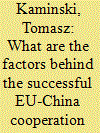| Srl | Item |
| 1 |
ID:
167132


|
|
|
|
|
| Summary/Abstract |
Against the background of ever stronger linkages between the EU and China as well as their emphatically voiced objective to jointly shape the increasingly multi-polar world, the article at hand endeavors to address the question how a liberally informed EU and a politically distinctly illiberal China may actually come to cooperate, that is, “work together for a common purpose”. To this end, this analysis reviews the past decade of EU-China normatively divergent, and even competitive encounters in Central Asia’s security realm and, on this basis, delineates a possible future mode of EU-China interaction in and beyond Central Asia, illustrating what cooperation between normatively divergent powers could look like in a multi-polar age.
|
|
|
|
|
|
|
|
|
|
|
|
|
|
|
|
| 2 |
ID:
167134


|
|
|
|
|
| Summary/Abstract |
Analysing the relations between the EU and China one can notice a growing network of links on all levels, including subnational. Within the framework of the One Belt One Road (OBOR) Initiative Chinese regions are eager to develop contacts with European counterparts. The case of the Lodzkie region’s (Poland) cooperation with Sichuan Province is often presented in media as a flagship example of taking the advantage of the possibilities posed by the OBOR. The direct cargo train connection with China has been accompanied by close political relations on the regional level as well as academic cooperation. Neither distance nor great asymmetries between the partners impede smooth collaboration in the Lodzkie case. The main aim of this paper is to answer the question what are the factors behind the success of the Lodzkie region in order to recognise the conditions that may play an important role in the process of building strong bilateral links between European and Chinese subnational units. The Lodzkie case clearly shows the key role of the personal factor. Politicians and officials have identified a great potential in a small-scale business initiative and have helped it to enhance in cooperation with local stakeholders (the city authorities, academia, local companies). Moreover, they have been able to create an attractive story which appeals to international media and attracts business.
|
|
|
|
|
|
|
|
|
|
|
|
|
|
|
|